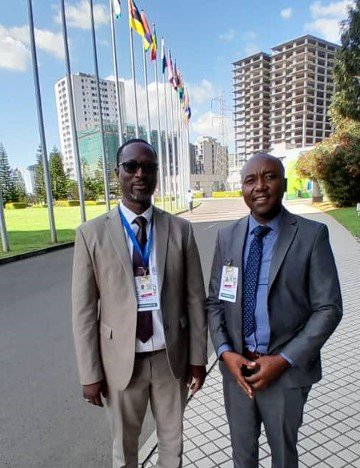A month on: what next after landmark African Union ban on the donkey skin trade?
One month on from the African Union's historic decision to ban the donkey skin trade, Head of External Affairs Valentina Allen takes a look at what comes next as countries navigate legislation.
I was too excited to sleep during the night between the 17-18 February: a critical vote was to happen and its outcome would mark an unprecedented victory for Brooke’s campaigning efforts over the years. The thrill, when I finally read our proposal to ban the slaughter of donkeys for their skins was adopted by the African Union! Victory, at last!
Steve - a story of broken and restored hopes
Imagine the scene… We’re in Kenya, where we meet Steve, whose two donkeys are vital to water provision for his whole community. He wants to become a doctor and he uses the income generated by selling the water to pay for his education. One day, Steve wake ups and finds out his donkeys are missing. Eventually, a friend informs him that his donkeys were found: horrifically slaughtered for their skins. Heartbroken by the loss of his trustworthy working companions, Steve is unable to work and to save for this studies. We have a happy ending for this story: thanks to Brooke East Africa and its partner KENDAT, a new donkey, Lucky Joy, was sourced and gifted for Steve who could then return to work and resume saving, but many people are not so lucky.
I have read tearful stories like Steve’s for years. Every year, nearly six million donkeys are killed for their skins, which is used to produce ejiao, a traditional Chinese medicine used in beauty and food products. As China’s donkey population has depleted, the ejiao industry has turned to other countries to fuel its demand… whatever the cost.

Splendid news... and what next?
For advocates like me and my Brooke colleagues, who have been campaigning tirelessly, the African Union decision represents a huge milestone: more than 32 million donkeys could be protected from this horrific business. This vote is the beginning of a whole new chapter and our task is to bring otherwise silent policy language into life.
What needs to be done at this stage?
This is where things become a little less clear, as individual countries will now begin to adopt the legislation on differing timescales. In some, such as Kenya, the constitution ensures that African Union laws are automatically integrated into their domestic legal system. However, this is unfortunately not the case for all. Brooke will continue putting all our efforts into working closely with our partners, such as AU-IBAR, to ensure countries can implement the ban effectively by providing expert assistance and knowledge of donkey health and welfare.
While Africa ensures it is safe from this dreadful practice, what about other regions?
What if we look at countries in Latin America and South Asia for example; can the African ban be detrimental for donkeys elsewhere? Yes, it can and in fact it has been. While we have been campaigning to starve the supply chain in Africa, pockets of slaughter and trade have quickly emerged and replicated its atrocious consequences on animals and people. Like-minded organisations have worked hard to stop this from spreading and to promote a similar region ban, for example in Brazil.
Brooke’s unique position with programmatic operations and partners in countries allows us to be at the forefront of official consultations with governments and directly work with communities. This means we are able to deliver our strategic approach focused on policy change and animal protection to secure long-lasting change for donkeys globally.
Following this ban, traders will do anything to source the skins, especially relying on illegal methods. Tactical cooperation with governments and key partners is paramount to tackle this problem before it takes a devastating toll on the global donkey population.
Steve’s story perfectly showcases the invaluable role of working donkeys for rural and low-income communities. The Africa-wide ban is an excellent result and marks a new beginning.
They say hope lies in the dreams but with the excellent result of the Africa-wide ban I say hope lies in commitment, passion and determination to always be the voice of the voiceless and work relentlessly to ensure Steve’s story is a thing of the past.
